20 Ideologies of the early 20th century by Dean Kennedy
1. Understanding ideologies inquiry
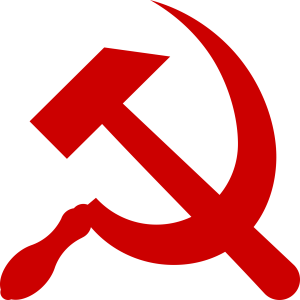
Hammer and Sickle Wikimedia Commons, Public Domain
| Curriculum Context | VCE Unit 1 Modern History: Change and Conflict – Ideology and Conflict (VCAA, 2020) |
| Historical Context | Ideologies of the early 20th century |
| Historical Thinking Concepts | Establish historical significance
Explore historical perspectives |
| Learning Intentions | Introduction to the concept of ideology and how it plays a part in life today.
Introduction and identification of various ideologies present and developing during the early 20th century. Identify significant players and events attached to these ideologies. |
Activity
What is ideology? Does it affect us today?… Absolutely!
Ideology is defined as ‘a systematic scheme of ideas, usually relating to politics, economics, or society and forming the basis of action or policy’ (Oxford English Dictionary, 2023). The definition stretches further to ‘myth and belief’ that motivate actions and movements at any scale from individual to the masses (Dictionary.com, 2023). Where do these descriptions fit today? Russia has invaded Ukraine with an expansionist mindset and no regard or acknowledgment of Ukrainian sovereignty due to political ideology born from the former Soviet Union.
Capitalism has allowed CEOs to make billions while the pay disparity with workers has become unfathomably vast. The United States of America is at odds over the Supreme Court’s decision to allow States to decide on Abortion rights. Right-wing extremists stormed the Capital Building after Donald Trump’s election loss with cries of election fraud and fake news.
Furthermore, in the wake of June and July 2023 being recorded as the hottest ever on record, the world faces a climate crisis that some groups choose to deny exists (Time Magazine, 2023). Systems of ideas and beliefs – Ideology – dominate the 21st century. To understand this and much more, it is important to investigate ideologies of the early 20th century and their fundamental significance to the historical events that shape our world today.
Main inquiry task
In pairs or groups of three, each group will be assigned an ideology that holds significance to the early 20th: communism; imperialism; fascism; capitalism; and Nazism.
Each group will research and construct:
- A definition of their specific ideology.
- 1-3 examples of the ideology’s historical significance.
- 1-3 examples of significant figures/individuals attached to their ideology.
- An example of who was impacted positively by this ideology.
- An Example of who was impacted negatively by this ideology.
- Use and provide a list of websites and sources (at least 2) used to find this information.
Suggested sources for your inquiry
You may find this list to be a helpful starting point; these can be one of your listed resources. See if you can find some others (at least two overall). Bonus points for primary sources – quotes, diaries, photographs, witness accounts, letters, etc.
| Socialism & Communism:
Communism and Socialism: What’s the Difference? (NowThis Originals, 2017). |
| Communism:
Communism (Khan Academy, 2011). |
| Capitalism & Socialism:
History of Ideas – Capitalism (The School of Life, 2015). Capitalism and Socialism Crash Course (Khan Academy, 2023) |
| Fascism:
Fascism and Mussolini (Khan Academy, 2023) |
| Imperialism:
Imperialism Crash Course (Khan Academy, 2023) |
| Nazism (Khan Academy, 2013) |
At the end of the inquiry, the class will come together to share findings and construct an ideology study table which will be returned to the class as a collective study resource. You can consult this chart, revise it, and use it as a continuous resource as the unit continues. This resource will provide a foundational checklist for just some of the main ideas, individuals, and events of the early 20th century.
References
Borenstein S, (2023), ‘This June Was the Hottest on Record and July Is Getting Hotter,’ Time Magazine, sourced from: https://time.com/6294637/june-july-record-extreme-heat/
Dictionary.com, (2023), ‘Ideology,’ Dictionary.com, sourced from: https://dictionary.com/browse/ideology
Khan Academy, (2011), ‘Communism | The 20th century | World history | Khan Academy,’ YouTube, sourced from: https://www.youtube.com/watch?v=MmRgMAZyYN0
Khan Academy, (2023), ‘Capitalism and Socialism crash Course,’ Khan Academy, sourced from: https://www.khanacademy.org/humanities/whp-1750/xcabef9ed3fc7da7b:unit-4-labor-and-society/xcabef9ed3fc7da7b:4-1-labor/v/capitalism-and-socialism-crash-course-world-history-33-beta
Khan Academy, (2023), ‘Fascism and Mussolini,’ Khan Academy, sourced from: https://www.khanacademy.org/humanities/world-history/euro-hist/mussolini-fascism/v/fascism-and-mussolini
Khan Academy, (2023), ‘Imperialism,’ Khan Academy, sourced from: https://www.khanacademy.org/humanities/whp-1750/xcabef9ed3fc7da7b:unit-5-imperialism-colonialism-and-responses/xcabef9ed3fc7da7b:5-1-the-system-of-imperialism/v/watch-imperialism-crash-course-world-history-35
Khan Academy, (2023), ‘Initial rise of Hitler and the Nazis,’ Khan Academy, sourced from: Initial Rise of Hitler and the Nazis – https://www.khanacademy.org/humanities/world-history/euro-hist/hitler-nazis/v/initial-rise-of-hitler-and-the-nazis
NowThis Originals, (2017), ‘Communism vs Socialism: What’s the Difference?’ YouTube, sourced from: Communism vs. Socialism: What’s The Difference? – YouTube
Oxford English Dictionary, (2023), ‘Ideology,’ Oxford English Dictionary, sourced from: https://www.oed.com/search/dictionary/?scope=Entries&q=ideology
The School of Life, (2015), ‘HISTORY OF IDEAS – Capitalism,’ YouTube, sourced from: https://youtu.be/dIuaW9YWqEU
VCAA. (2020). VCE Study Design: History 2022-2026. Victorian Curriculum and Assessment Authority. https://www.vcaa.vic.edu.au/curriculum/vce/vce-study-designs/history/Pages/index.aspx
2. Take a propa-ganda! and café conversations (Facing History, 2023)
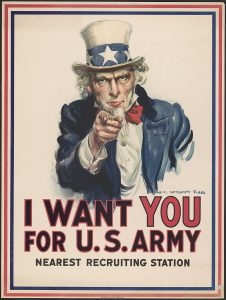
I Want You For US Army, James Montgomery Flagg, Wikimedia Commons, Public Domain
| Curriculum Context | VCE Unit 1 Modern History: Change and Conflict – Ideology and Conflict (VCAA, 2020) |
| Historical Context | Ideologies of the early 20th Century |
| Historical Thinking Concepts | Use sources as evidence
Explore historical perspectives |
| Learning Intentions | Use prior knowledge to observe, interpret and infer the intentions of propaganda and its links to ideology and significant historical events.
Learn to think historically by role-playing civilian perspectives of significant moments in history. Learn to avoid viewing history through the present lens – presentism (Allender et al. 2019, p. xxv). |
Activity
Part 1: Source analysis
Students will be working in the same groups as Activity 1. Each group will be provided with images of propaganda posters aligned or related to an ideology and events significant to the early 20th century. Click on the links for an enlarged view.
Questions for this source analysis
WHO might be the target audience?
WHO or WHAT is being represented and/or depicted?
WHY might this poster exist?
WHAT might be the aim of this propaganda?
WHEN might this propaganda have been produced?
.
Source 1 – Lindsay N, (1918), ‘Australian World War 1 Poster Public Domain
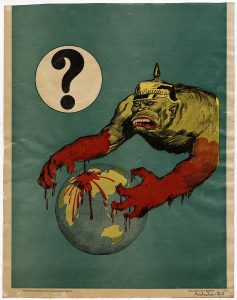
Source 2
Weston H J, (1931), ‘Smash the Red Wreckers and Save Australia’Public Domain
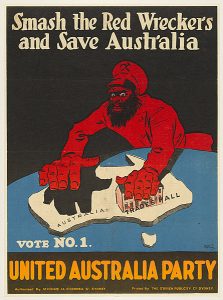
Source 3
National Archives at College Park, (C. 1942), ‘Keep Punchin’ Public domain

Source 4
Deni V, (1919), ‘Kapital,’ Public domain, Public Domain

Source 5
Partynia, (1944), ‘Parasit,’ CC BY-SA 4.0
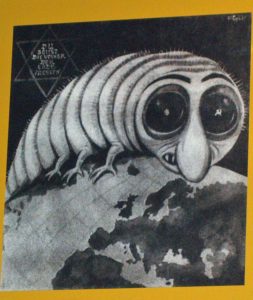
Source 6
US Government, (2021), ‘Don’t Speak the Enemy’s Language, Speak American,’ Public Domain

Part 2 Café conversations (Facing History, 2023)
In your groups: Put yourself in the shoes of a civilian at this period, how would these images make you feel?
Think about the different perspectives of civilians from the various ideologies and countries discussed. Use this time to exercise a multiple perspectives discussion, or Café Conversations style discussion strategy (Facing History, 2023). Choose a poster, and imagine you have been seeing this imagery a lot recently – you are meeting friends at a café reflect on the events, conflicts, ideas and individuals that are connected to your chosen image, and put yourself in the shoes of a civilian in the respective country. Are you scared? Proud? Motivated? Shocked? Do you agree with the ideology linked to the image?
Civilian roles to choose from:
- Parent with young children
- Parent with a son of military age
- School teacher
- Shop owner or worker
- Civilian of military age
Think about the period your image belongs to and do your best to remove yourself from viewing history through your current socio-environmental and biased lens and place yourself in their shoes – this is known as presentism; and something we as students of history must do our best to avoid (Allender et al. 2019: xxv).
There are no wrong answers, but thinking historically means we must understand the social and political environments of the periods we study and interpret them with the evidence at hand. If you feel something, try to back it up with some of the evidence we have investigated over the last few lessons. You will get an opportunity to share some of the main points of your discussion with the class through a debrief discussion.
Note on ethical considerations These topics can be very distressing and confronting. Please advise if you are feeling any hesitation or discomfort toward attempting a role-play on these topics.
References
Allender T, Clark A, & Parkes R (Eds.), (2019), ‘Introduction,’ Historical thinking for history teachers: A new approach to engaging students and developing historical consciousness, Taylor & Francis Group.
Facing History and Ourselves, (2023), ‘Café Conversations,’ Facing History and Ourselves, sourced from: https://www.facinghistory.org/resource-library/cafe-conversations
Staats J, (2018), ‘Historical Perspectives, Empathy and Historical Consciousness,’ Teaching History, 52(1), 32–40.
VCAA. (2020). VCE Study Design: History 2022-2026. Victorian Curriculum and Assessment Authority. https://www.vcaa.vic.edu.au/curriculum/vce/vce-study-designs/history/Pages/index.aspx

